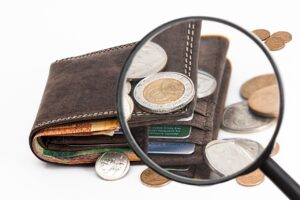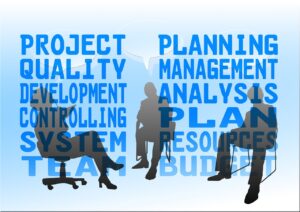
In the grand journey of personal development, we often focus on improving our emotional intelligence, physical well-being, and mental resilience, which are undoubtedly essential facets of growth and happiness. However, one aspect that’s occasionally overshadowed, yet immensely influential, is financial wellness.
Your financial health, though not the sole determinant of happiness, can significantly impact your overall well-being and personal development. Here, we’ll delve into the profound connection between financial wellness and personal growth, shedding light on how a sound financial foundation can empower you to achieve your full potential. We’ll explore the far-reaching impact of financial well-being on various aspects of personal development and provide you with valuable tips on budgeting, saving, and investing to secure your financial future.
Financial Wellness: The Unsung Hero of Personal Development
In the pursuit of personal development, we often chase qualities like happiness, confidence, and fulfilment. However, financial wellness is an integral, if sometimes overlooked, contributor to achieving these objectives. Here’s how it plays a pivotal role:
- Reducing Stress and Anxiety
Imagine waking up every day, knowing that your financial house is in order. Bills are paid, savings are growing, and there’s a safety net to catch you if life throws a curveball. Financial wellness offers you precisely this peace of mind. It reduces stress and anxiety, allowing you to focus on what truly matters in your personal development journey.
Implementing a budget and building an emergency fund will ensure the weight will lift off your shoulders. This newfound financial stability not only reduces your stress but also improves your overall well-being, enabling you to pursue your personal development goals with greater enthusiasm. Financial stability significantly reduces stress and anxiety. When you’re in control of your finances, you’re better equipped to handle life’s unexpected challenges. Financial wellness means fewer sleepless nights and more peace of mind.
- Boosting Self-Confidence
Your financial well-being is closely tied to your self-confidence. When you’re financially empowered, you feel more in control of your life. You know that you can handle financial challenges and are better prepared for the unexpected. This boost in self-confidence often spills over into other areas of your personal development. As you take control of your financial future, you realise that you’re capable of setting and achieving monetary goals. This newfound confidence spills over into other areas of your life, allowing you to face new challenges and opportunities with self-assuredness.
- Promoting Goal Achievement
Setting and achieving financial goals is a transformative experience. It instils qualities like discipline, patience, and resilience that are essential in personal development. These are qualities that can be transplanted into other facets of personal development. Whether you’re saving for a dream vacation, buying a home, or securing your retirement, the process of planning and accomplishing financial goals becomes a blueprint for success in life.

The Power of Budgeting
A personal budget is like a map that guides you on your financial journey. It provides clarity about your income, expenses, and financial goals. A crucial step in achieving financial wellness is effective budgeting. This financial tool acts as your map on the road to economic stability. Here’s how budgeting aids in personal development:
Creating a Personal Budget
A personal budget is a snapshot of your financial life. It helps you understand how much money you have, where it’s going, and what’s left over. This knowledge empowers you to make informed decisions about your financial priorities and allocate resources efficiently. It is much more than a simple ledger; it’s your financial GPS, and it offers several advantages in shaping your financial well-being:
- Income Clarity:
A budget begins by documenting all sources of income. This includes your salary, side gig earnings, investments, rental income, or any other inflow of funds. By collecting and organising this data, you get a clear picture of your financial inflow within a specific period, typically a month.
- Expense Breakdown:
Equally important is the detailed listing of your expenses. Your budget classifies these expenditures into different categories, such as housing, utilities, groceries, transportation, insurance, debt payments, and discretionary spending. This categorisation helps you understand where your money is being spent.
- Spending Patterns:
Your budget unveils not just how much you’re spending but also where your expenses are allocated. It aids in identifying trends in your spending habits, such as excessive restaurant dining, impulsive shopping, or overspending on entertainment. Recognising these patterns empowers you to make necessary changes and exercise better financial control.
- Tracking Discrepancies:
By calculating your income versus your expenses, your budget highlights any discrepancies between the two. This reveals whether you’re consistently spending more than you’re earning or if you have the opportunity to save or invest more effectively. Understanding these financial imbalances is crucial for achieving and maintaining financial stability.
- Identifying Financial Priorities:
Your budget helps you to recognise your financial priorities. Whether it’s building an emergency fund, paying off debt, or investing for retirement, the budget lets you define and align your financial goals with your income and expenses. This alignment is essential for optimising the use of your financial resources to meet your objectives.
- Decision-Making Tool:
Armed with the knowledge provided by your budget, you can make well-informed financial decisions. Your financial choices are no longer based on guesswork or vague estimations; they’re grounded in concrete, data-driven insights about your financial health. This minimises the risk of impulsive or uninformed financial decisions.
- Motivation and Accountability:
A budget is not just a passive tracking tool; it’s a source of motivation and financial accountability. As you monitor your financial progress through your budget, you observe the incremental steps you’ve taken toward achieving your financial goals. This progress serves as a motivating factor, encouraging you to adhere to your budget and stay on course.
- Emergency Preparedness:
One of the practical benefits of a budget is that it ensures you are prepared for unforeseen financial challenges. With a comprehensive budget, you are well-informed about your financial situation, allowing you to respond to unexpected expenses or emergencies without sinking into debt. An emergency fund, for example, is easier to establish and maintain when your budget highlights the importance of this financial cushion.
A budget is a powerful tool for setting and tracking financial goals. Whether it’s saving for an emergency fund, paying off debts, or investing in your future, a budget helps you prioritise and achieve these objectives.

Tips for Sticking to Your Budget
Creating a budget is one thing, but adhering to it is another challenge. Here are some practical tips to maintain discipline and ensure that your budget becomes a valuable tool for personal development:
- Track your spending diligently using apps or spreadsheets.
- Review your budget regularly to make necessary adjustments.
- Prioritise essential expenses and allocate funds for personal development pursuits.
- Consider using the envelope system, where you allocate cash for different spending categories.
The Importance of Saving
Savings serve as the foundation of financial wellness. They provide a safety net for life’s unexpected events and a source of funds for future investments. In this section, we’ll explore the role of saving in building financial wellness:
Having an emergency fund can provide peace of mind during unexpected financial crises. Having a financial cushion can be a game-changer for your mental and emotional well-being.
There are various options for saving, each with its advantages and disadvantages.
Let’s explore these to help you choose the best savings strategy for your financial goals:
Traditional Savings Accounts: These are easily accessible and suitable for short-term goals or as an emergency fund. They provide liquidity but offer relatively low interest rates.
High-Yield Savings Accounts: These accounts offer better interest rates, making them an attractive choice for mid-term savings goals. They are accessible and provide higher returns on your deposits.
Certificates of Deposit (CDs): CDs offer higher interest rates than regular savings accounts but require you to lock in your funds for a specific term. They are ideal for long-term savings objectives.
One effective way to ensure you consistently save money is to automate the process. Setting up automatic transfers can make saving effortless, allowing you to build a financial safety net over time.
I strongly recommend consulting a certified financial advisor for personalised guidance and advice.
Tools and Resources
To support you in your quest for financial wellness and personal development, there is a wide range of tools and resources available but these differ from country to country so please check out what is relevant to your location.
These are designed to empower you with knowledge, simplify financial management, and help you make informed decisions. Here’s a look at the valuable tools and resources you can utilise:
- Budgeting Apps and Software:
In today’s digital age, there are numerous budgeting apps and software solutions that can streamline the budgeting process. These tools often connect to your bank and credit card accounts, automatically categorise expenses, and provide real-time updates on your financial situation. Examples include Mint, YNAB (You Need A Budget), Personal Capital, and Quicken.
- Retirement Planning Tools:
To plan for a secure retirement, there are tools and resources that can help you. One such tool is a Retirement Calculator: Online retirement calculators can estimate how much you need to save for retirement and how different factors, such as contribution amounts and investment returns, impact your retirement fund.
- Debt Management Tools:
If you’re dealing with debt, there are resources to help you manage and pay it off efficiently:
Debt Consolidation Tools: Websites and financial institutions offer tools to consolidate multiple debts into one manageable payment.
Credit Counselling Services: Non-profit credit counselling agencies can assist with debt management, budgeting, and negotiations with creditors.
Debt Repayment Strategies: Explore various debt repayment methods, such as the snowball method or the avalanche method, to find the one that best suits your situation.
- Emergency Fund Calculator:
Tools are available to help you determine how much you should have in your emergency fund based on your living expenses, so you can be prepared for unexpected financial setbacks.
- Credit Score Monitoring Services:
Stay informed about your credit health by using credit score monitoring services. They track your credit score and provide insights on factors that affect it.
- Online Savings and Investment Accounts:
Explore online banks and investment platforms that offer high-yield savings accounts, investment accounts, and retirement accounts. These platforms often provide lower fees and higher returns compared to traditional financial institutions.
- Financial Podcasts and Webinars:
Many experts and organisations host financial podcasts and webinars that cover a wide range of personal finance and investment topics. These resources offer valuable insights and advice in an easily accessible format.
8. Online Forums and Communities:
Participate in online financial forums and communities where you can seek advice, share experiences, and learn from the financial journeys of others. Websites like Reddit’s personal finance subreddit and Bogleheads provide opportunities to engage with a supportive community.

We’ve explored the profound connection between financial wellness and personal development. While money may not be the ultimate key to happiness, managing your finances effectively is undeniably a crucial step in achieving a better life. By reducing stress and anxiety, boosting self-confidence, and promoting goal achievement, financial wellness becomes a catalyst for personal growth.
Budgeting, saving, and investing are not mere financial activities; they are life skills that empower you to shape a more secure and fulfilled future. Your journey toward financial wellness and personal development is an ongoing process. By using these tools and resources, you can equip yourself with the knowledge and means to take control of your financial well-being.
Whether you’re budgeting, saving, investing, managing debt, or planning for retirement, these resources are valuable companions on your path to a brighter, more secure future.
So, embrace the profound connection between financial wellness and personal growth, and remember that achieving financial wellness isn’t just about securing your future; it’s about unlocking your full potential and enjoying a life filled with possibilities. Financial wellness is a lifelong journey, and it’s never too late to start .
Start your journey today, and watch how a sound financial foundation positively impacts your personal development. Your future self will thank you for taking these crucial steps toward a happier, more prosperous life.
N.B – I strongly recommend consulting a certified financial advisor for personalised guidance and advice.

